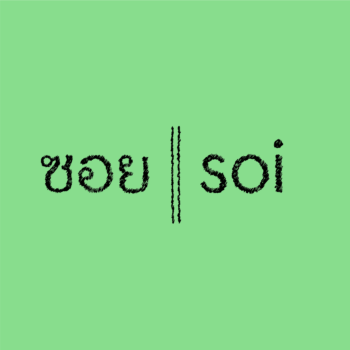
สำหรับนักอ่านไทยหลายคน ชื่อ ‘ภัควดี วีระภาสพงศ์’ ไม่เคยห่างไกลไปจากความคุ้นเคย ไล่เรียงตั้งแต่นักเรียนมัธยมไปจนถึงนักวิชาการ รวมถึงใครหลายคนที่คอยติดตามสถานะการณ์การเมืองอย่างใกล้ชิด ภัควดีมีชื่อเสียงจากงานแปลวรรณกรรมของอุมแเบร์โต เอโก และมิลาน คุนเดอรา หรืองานแปลเกี่ยวกับขบวนการเคลื่อนไหวของประชาชนในลาตินอเมริกา จุดยืนทางการเมืองของภัควดีเองก็สอดคล้องพ้องจองไปกับผลงานที่เธอผลิตออกมาเป็นอย่างดี สำหรับบทสัมภาษณ์ชิ้นนี้ ภัควดีพูดถึงสนามการต่อสู้ที่ลงลึกไปสู่ระดับวัฒนธรรม รวมไปถึงศักยภาพของงานแปลที่ช่วยเปิดทางให้ความอยุติธรรมอันเล็ดลอดกรอบกรงของภาษาของเราได้ปรากฏตัวผ่านความแปร่งปร่าและการสร้างใหม่ของกระบวนการแปล
ส่วนหนึ่งของงานแปลของภัควดีที่ถูกตีพิมพ์ได้แก่ สมัญญาแห่งดอกกุหลาบ โดยอุมแเบร์โต เอโก, ความเบาหวิวเหลือทนของชีวิต โดยมิลาน คุนเดอรา, 3 เล่มแรกของจตุรภาคเกาะบูรู โดยปราโมทยา อนันตา ตูร์, Philip Marlowe Series โดย เรย์มอนด์ แชนด์เลอร์, และประวัติศาสตร์ฉบับย่อของลัทธิเสรีนิยมใหม่ โดยเดวิด ฮาร์วีย์ เธอยังเขียนบทความลงแพลตฟอร์มของประชาไท ฟ้าเดียวกัน อ่าน และสารคดี
1
1. คุณสนใจขบวนการเคลื่อนไหวของประชาชนในประเทศ ขยายจนไปถึงภูมิภาคต่างๆ มาโดยตลอด แถมยังแปลผลงานงานหลายชิ้นเกี่ยวเนื่องกับประเด็นเหล่านี้ ลองแชร์กับเราว่ามีผลงานเขียนประเภทไหน ตัวบทของใคร หรือวรรณกรรมจากภูมิภาคไหนบ้างที่คุณอยากให้ถูกแปลเป็นภาษาไทยมากขึ้น อาจเป็นตัวบทที่คุณคิดว่าจะสามารถสร้างมุมมองจนถึงข้อถกเถียงใหม่ๆ หรือเข้ามาหนุนเสริมบทสนทนาที่มีอยู่ในบริบทของไทยได้บ้าง?
อันที่จริง แรกเริ่มเดิมทีนั้น ดิฉันสนใจขบวนการเคลื่อนไหวในต่างประเทศก่อน ทั้งนี้เพราะในบริบททางสังคมช่วงนั้น ประเทศไทยยังอยู่ในระบอบประชาธิปไตย ความขัดแย้งภายในประเทศมักเป็นเรื่องความเหลื่อมล้ำทางเศรษฐกิจหรือประเด็นการแย่งชิงทรัพยากรมากกว่า ความสนใจหลักของดิฉันเป็นเรื่องการต่อต้านระบบทุนนิยมเสรีนิยมใหม่ ดังนั้น จึงสนใจความเคลื่อนไหวของขบวนการประชาชนที่ต่อต้านระบบทุนนิยม ไม่ว่าจะเป็นการต่อต้านข้อตกลง WTO ข้อตกลงการค้าเสรี การต่อสู้ของประชาชนในละตินอเมริกาและในภูมิภาคต่างๆ ดิฉันสนใจอ่านเรื่องราวเหล่านี้ เพราะคิดว่าอาจเป็นต้นแบบสำหรับการต่อสู้กับระบบทุนนิยมเสรีนิยมใหม่ในประเทศไทย ซึ่งจะต้องเกิดขึ้นแน่ๆ
แต่ภายหลังการรัฐประหาร 2549 เมืองไทยหวนกลับมามีความขัดแย้งทางการเมืองในระดับรากฐานอีกครั้ง ในช่วงสิบกว่าปีมานี้ ดิฉันหันมาสนใจความผันผวนทางการเมืองในประเทศมากขึ้น และลดการติดตามขบวนการเคลื่อนไหวในต่างประเทศลงอย่างมาก นอกจากนี้ แม้แต่ในช่วงที่ติดตามขบวนการต่างประเทศนั้น ดิฉันอ่านบทความออนไลน์และข่าวจากนักเคลื่อนไหวในแนวหน้ามากกว่างานหนังสือหรือทฤษฎี ดังนั้นจึงอาจตอบคำถามนี้ไม่ได้มากนัก อย่างไรก็ตาม คิดว่างานของ David Graeber งานศึกษาเกี่ยวกับขบวนการต่างๆ เช่น ซาปาติสตา ขบวนการแรงงานไร้ที่ดินในบราซิล ขบวนการประชาชนในพื้นที่ต่างๆ ทั่วโลก ยังเป็นต้นแบบที่น่าสนใจ รวมทั้งหนังสืออื่นๆ ที่นักเคลื่อนไหวผู้ลงมือปฏิบัติการเป็นผู้เขียนเอง เช่น Saul Alinsky
2
2. ถ้า ‘การแปล’ ไม่เคยเป็นแค่การแปลงตัวบทหนึ่งไปสู่อีกตัวบทหนึ่ง แต่มันยังเป็นการนำพาบริบทของความคิดนั้นมาจัดวางใหม่เพื่อเทียบเคียงดูกับเงื่อนไขของภาษาที่งานแปลนั้นเดินทางมาถึง จากประสบการณ์แปลนวนิยายของคุณ ไปจนถึงงานปรัชญา ทฤษฎีสังคมศาสตร์ เศรษฐศาสตร์ และการเมือง คุณมองว่านักแปลมีส่วนในการสานต่อสุ้มเสียงในตัวบทให้มันยังคงอยู่ในภาษาเดิม พร้อมๆ กับสร้างสรรค์บางอย่างขึ้นเพื่อให้ตัวบททำงานในภาษาใหม่ได้อย่างไร?
มันเป็นความเข้าใจผิดอย่างมากเลยนะคะว่า นักแปลหรือผู้ปฏิบัติงานด้านการแปลจะต้องมีแนวคิดเกี่ยวกับทฤษฎีการแปล นักแปลเกือบทั้งหมดในโลกนี้ทำงานแปลโดยไม่มีทฤษฎีในใจ จะเรียกว่าเราทำงานมะงุมมะงาหราไปในความมืดก็ได้ เช่นเดียวกับนักเขียนส่วนใหญ่ที่เขียนโดยไม่ได้มีทฤษฎีการเขียนในใจมาก่อน หลังจากที่ดิฉันทำงานแปลมาระยะหนึ่ง ดิฉันเคยสนใจอ่านงานด้านทฤษฎีการแปลอยู่บ้าง และเคยแปล/เขียนบทความเกี่ยวกับทฤษฎีการแปลอยู่ 2-3 ชิ้น แต่ดิฉันไม่เคยมีข้อสรุปหรือทฤษฎีเป็นของตัวเองอย่างชัดเจน ถึงที่สุดแล้ว ในขณะทำงานนั้น เราจะพบว่าเราใช้หลายทฤษฎีปะปนกัน บางที Umberto Eco น่าจะเป็นคนที่นิยามการแปลได้ใกล้เคียงกับการปฏิบัติงานจริงมากที่สุด กล่าวคือ การแปลคือการต่อรอง เราต่อรองกับตัวบททุกคำ ทุกประโยค ทุกย่อหน้าและทุกเล่ม และเราใช้ทุกทฤษฎีปนกันหมดเท่าที่คิดว่าจะทำให้เกิดผลลัพธ์ที่ดีที่สุด
ความเข้าใจผิดเล็กๆ อีกประการคือ ดิฉันแทบไม่เคยแปลงานปรัชญาหรือทฤษฎีด้านสังคมศาสตร์เลย งานแปลของดิฉันเป็นนวนิยายและงานวิชาการ งานวิชาการส่วนใหญ่เป็นงานด้านเศรษฐศาสตร์การเมือง
ในคำถามที่ว่านักแปลมีส่วนในการสร้างสรรค์บางอย่างเพื่อให้ตัวบททำงานในภาษาใหม่อย่างไรนั้น ดิฉันคิดว่านักแปลคือคนที่พยายามผลักดันพรมแดนของภาษาและมโนทัศน์ในภาษาเก่าให้ขยายออกไปมากขึ้นเพื่อรองรับภาษาและมโนทัศน์ใหม่ๆ ที่ไม่เคยมีมาก่อนในภาษาเดิม บางครั้งการบัญญัติศัพท์คำแปลกๆ ขึ้นมาใช้จนเป็นเหตุให้ผู้อ่านวิพากษ์วิจารณ์เย้ยหยันนั้น หลายครั้งก็เกิดขึ้นเพื่อขยายพรมแดนของภาษาและมโนทัศน์ ถึงแม้ผู้อ่านอาจจะไม่ชอบใจ แต่อย่างน้อยผู้อ่านก็ถูกกระตุกให้คิดว่า มันมีมโนทัศน์บางอย่างที่ไม่มีอยู่ในภาษาเดิมหรือในโลกทัศน์ท้องถิ่น ถ้าผู้อ่านสามารถก้าวข้ามความแปลกประหลาดของคำศัพท์ไปได้ โลกทัศน์ของผู้อ่านก็อาจขยายกว้างขึ้นกว่าเดิม จนถึงจุดที่คำศัพท์คำนั้นไม่แปลกประหลาดอีกต่อไป ตัวอย่างที่ดิฉันยกบ่อยๆ ก็เช่นคำว่า โลกาภิวัตน์ เป็นต้น
3
3. คำถามนี้ต่อจากคำถามข้อก่อนหน้า เมื่อกิจของการแปลเป็นการสานและสางประเด็นเพื่อถ่ายโอนมันลงในภาษาใหม่ โดยตัวมันเองก็นับเป็น activism แบบหนึ่งแล้ว เหนือกว่านั้นกระบวนการแปลยังสามารถทำให้เกิดการเรียนรู้ผ่านพื้นที่ของตัวบทมาสู่พื้นที่ของการขับเคลื่อน การแก้ไขปัญหาต่างๆ ในทางการเมืองได้ด้วย ในฐานะนักแปล คุณเห็นความสัมพันธ์เหล่านี้ยังไงบ้าง? และตัวคุณเองมีวิธีการ มุมมอง หรือจุดยืนแบบไหนที่เป็นฐานค้ำยันงานแปลของคุณหรือไม่ นับตั้งแต่การเลือกแปล/ไม่แปลชิ้นงานไหน ไปจนถึงการเลือก/ไม่เลือกใช้คำบางชนิด เป็นต้น?
ดังที่ตอบไปในข้อก่อนหน้าว่า การแปลคือการขยายพรมแดนของภาษาและมโนทัศน์ ดังเช่นคำว่า สิทธิมนุษยชน สิทธิในเนื้อตัวร่างกาย ฯลฯ ที่เราใช้กันอยู่ในทุกวันนี้จนเป็นคำปรกติสามัญในชีวิตประจำวัน แต่ในอดีตเมื่อ 30-40 ปีก่อน คำเหล่านี้ไม่มีอยู่ และแม้บางครั้งเรารู้สึกอึดอัดทุกข์ใจกับการถูกละเมิดสิทธิ ์ เช่น ในโรงเรียน ในสถานที่ทำงาน ฯลฯ เวลาที่เราไม่มีคำเรียกความอึดอัดทุกข์ใจนี้ เราจะพบว่าตัวเองขาดไร้พลังในการต่อสู้และเรียกร้องการแก้ไขปัญหา การที่มโนทัศน์ของสิทธิถูกโอนถ่ายเข้ามาสู่สังคมของเรา การทำให้ความทุกข์นี้มีชื่อมีคำเรียก มันสร้างพลังให้แก่ผู้ถูกละเมิดอย่างใหญ่หลวงชนิดที่จินตนาการไม่ถึงเลยทีเดียว การต่อสู้ทางการเมืองที่ลงลึกไปถึงระดับวัฒนธรรมในเมืองไทยตอนนี้ ก็มาจากการถ่ายโอนมโนทัศน์ (หรือการแปล) แบบนี้นั่นเอง
ในส่วนตัวของดิฉันนั้น เนื่องจากดิฉันมีแนวคิดไปทางฝ่ายซ้าย ดิฉันจึงมักเลือกแปลงานที่วิพากษ์วิจารณ์ระบบทุนนิยม แต่ในขณะเดียวกัน ดิฉันก็ไม่ปฏิเสธการแปลงานที่วิพากษ์วิจารณ์ระบบสังคมนิยม (เช่น นวนิยายของมิลาน คุนเดอรา) ส่วนการเลือก/ไม่เลือกใช้คำนั้น ดิฉันใช้ตามหลักการแปลทั่วไป เช่น พยายามไม่ใช้คำทางศาสนาพุทธแปลแนวคิดตะวันตก (แต่ก็ไม่เสมอไปเช่นกัน ขึ้นอยู่กับการต่อรองขณะแปล)
4
4. ถ้าให้เปรียบเทียบกิจของการแปลกับอุปมาอุปไมยสักอย่าง คุณคิดว่าการแปลเหมือนกับอะไร? แล้วทำไมถึงเป็นแบบนั้น?
ดิฉันชอบวลีหนึ่งที่นักแปลต่างประเทศคนหนึ่งใช้ การแปลคือการแสดงที่ไร้เวที นักแปลสร้างงานอยู่ด้านหลังตัวบท แต่เขาไม่มีตัวตน หรือในอีกแง่หนึ่งคือไม่มีใครมองเห็นเขา
5
5. มีหนังสือเล่มไหนบ้างที่คุณมักกลับมาเปิดอ่านอยู่บ่อยครั้ง หรือมีนักเขียนคนไหนบ้างที่จุดประกายให้คุณได้เรียนรู้อะไรต่อมิอะไรเพื่อเอามาปรับใช้กับงานเขียน/งานแปล?
ไม่มีเล่มไหนเป็นพิเศษ แต่ถ้าในแง่ของอิทธิพลต่อสำนวนภาษาในการแปลแล้ว ดิฉันได้รับอิทธิพลจากงานแปลงานเขียนสมัยก่อนค่ะ เช่น อ.สายสุวรรณ แสงทอง (หลวงบุณยมานพพาณิชย์) เป็นต้น ในส่วนงานแปลนั้น บรรณาธิการงานแปล ไม่ว่าจะเป็นใครก็ตาม มีอิทธิพลให้เราได้เรียนรู้ เห็นตัวเองและปรับปรุงตัวเองในการแปล
6
6. ถ้าเราลองชวนมองผ่าน #ถ้าการเมืองดี คุณคิดว่า #ถ้าการเมืองดี จะมีอะไรเกี่ยวกับงานแปลในสังคมไทยที่จะเฟื่องฟูมากขึ้นได้บ้าง?
#ถ้าการเมืองดี หนังสือจะไม่ใช่ของฟุ่มเฟือย ราคาหนังสือเมื่อเทียบกับค่าครองชีพจะไม่สูงมาก คนไทยจะอ่านหนังสือมากขึ้น เราจะไม่ต้องพิมพ์หนังสือด้วยกระดาษปอนด์หมดเพื่อให้คุ้มกับผลตอบแทน หนังสือหลายประเภทจะพิมพ์ด้วยกระดาษปรู๊ฟ มีน้ำหนักเบา ติดตัวไปอ่านที่ไหนก็ได้ ราคาไม่แพง คนไทยจะอ่าน e-book มากขึ้นเพราะเข้าถึงฮาร์ดแวร์ง่ายขึ้น หนังสือเล่มสำคัญและคลาสสิกจะมีการแปลเป็นภาษาไทยเกือบทุกเล่มแบบในเกาหลีใต้ ญี่ปุ่น อินโดนีเซีย หนังสือจะไม่ใช่ของศักดิ์สิทธิ์ที่ต้องอยู่บนหิ้งอีกต่อไป
[*English translation by Palin Ansusinha]
Pakavadi Weerapasapong’s name is no stranger to Thai readers of translated literature, from high school students to academics, and most of us who have been following the political situation in Thailand. She is best known for translating fiction by Umberto Eco and Milan Kundera, and works about the people’s movement in Latin America, but most notably for taking a strong political stance in her career and life as one of the same. In this interview, Pakavadi reflects on the political battlefield that lies deep at the cultural level, and the potential to make present the injustices that have historically eluded the limits of our language through the dissonant and creative process of translation.
Among Pakavadi’s many published translations are Umberto Eco’s The Name of the Rose, Milan Kundera’s Unbearable Lightness of Being, Immortality, Pramoedya Ananta Toer’s first three volumes of The Buru Quartet, Raymond Chandler’s Philip Marlowe series, David Harvey’s The Brief History of Neoliberalism. She wrote many articles for Prachatai news website, Fah Deaw Kan, Aan and Sarakadee Magazine.
1
1. You’ve always been interested in the people’s movements both in Thailand and abroad, which explains your many translations of works on and around this topic. Can you share with us some genres, authors, or literature from other regions that you would like to see translated into Thai that could potentially contribute to ongoing discussions in the Thai context?
Actually, I first became interested in the political movements abroad. Back then, Thailand’s social context was still democratic: internal conflicts often stemmed from economic inequality or expropriation of resources. My main concern is to resist neoliberal capitalism and so I was interested in anti-capitalist movements led by the people, such as movements against the WTO agreements, free market agreements, the people’s movements in Latin America and other regions. In reading these stories, I was looking for models that would resist the encroachment of neoliberal capitalism in Thailand, which, to me, seemed inevitable at the time.
However, since the military coup in 2006, Thailand has relapsed into the political conflicts rooted in its very foundations. In the past decade, I turned my attention towards the political turbulence happening inside the country and away from the protests abroad. But as I was still following the protests abroad, I started reading more online articles and reports coming from the frontline than books or theories, so this might not answer your question entirely. Nevertheless, David Graeber’s work on the different movements, such as the Zapatistas, Brazil’s Landless Workers’ Movement, and other movements around the globe, still offers fascinating models for me, including books written by engaged activists like Saul Alinsky.
2
2. If ‘translation’ is never simply a matter of translating one text into another, but it often encompasses the contexts that shaped certain thoughts and resituates them in the conditions laid out in the new language. Based on your experience of translating literature, philosophy and theories of sociology, economics and politics, what role do you see a translator play in carrying the voices in the original text and creating the conditions to receive the text in the new language?
There is a major misconception that translators, or those who work with and about translation, abide by certain theories. Almost all translators in this world translate without any theory in mind. We feel our ways in the dark, just as most authors write without a theory of writing. Having been translating for a while, I occasionally read some translation theories and have translated/written a few essays on them, though I never came to any clear conclusion or formed any theory of my own. Ultimately, we find ourselves in the process of melding various ideas along the way in the real work of translation. Perhaps Umberto Eco’s concept of translation may be closer to the actual practice, that is, to negotiate: in every text, word, sentence, paragraph and book, and to engage all the theories we know to get the best outcome.
Another slight misconception is that I barely or almost never translate philosophy or theory of sociology. Most of the time I translate novels and academic papers, particularly about economics and politics.
As for the role translators play in creating certain conditions for the text in a new language, I think that translators work to push against the linguistic and conceptual borders around the original language, stretching them to broaden the horizons for new languages and concepts to occur. Coining strange terms might lead to criticisms from readers, but they often happen for this very reason: to make present the concepts that didn’t exist in the original language and its worldview. If readers can get over the strangeness of these terms, their worldview simultaneously broadens and so the strangeness eventually becomes the familiar. An example I like to use is the term ‘globalisation’.
3
3. Translation is, in itself, a kind of activism in its movement from one language to another, in entangling and detangling relationships around certain topics. It has the potential to bridge the textual space with our immediate surroundings, propel change by addressing ongoing political problems. How do you view these relationships as a translator, and what stance do you take, for example, in what you choose to translate and word choice?
To elaborate on my previous answer, common terms like ‘human rights’, ‘consent’, etc., did not exist 30-40 years ago. We find ourselves powerless to demand for reparations without a language to articulate our frustrations. When the concept of ‘rights’ was introduced into our society, our pain was given a name and, in turn, it empowers those who were once victims of abuse to an unimaginable degree. The political fight that is going on deep at the cultural level owes itself to the ideas that derived from this kind of exchange made possible by translation.
As a left-leaning translator, I prefer to translate works that are critical of capitalism, but it does not mean that I would refuse to translate criticisms against socialism (such as Milan Kundera’s novels). As far as word choice is concerned, I follow the common approach, such as avoiding Buddhist terms for Western concepts (but not strictly as it depends on the negotiation that happens as you translate).
4
4. What metaphor would you use to describe your approach to translation?
There is an expression used by a foreign translator that I really like: translation is a stage-less performance; the translator works behind-the-scenes of the text, she doesn’t exist or, in other words, she is invisible.
5
5. Can you name any book(s) that you always revisit or author(s) you have learned a lot from as a writer/translator?
There are no books in particular, but stylistically speaking, I am influenced by the language used in old translated works, such as Ajarn Saisuwan Saengthong’s translations. Editors, whoever they are, have also been influential in helping me learn, reflect and better my translations.
6
6. How would translation work thrive in Thai society #IfPoliticsWasGood?
#IfPoliticsWasGood, books wouldn’t be a luxurious commodity. The price of books wouldn’t be costly for the cost of living. Thais would read more. We wouldn’t have to print with fine paper to guarantee a worthwhile return. More types of books would be printed with proof paper: lightweight, portable and affordable. Thais would read more e-books because devices are more accessible. All of the important literary works and classics would have been translated as they have been in South Korea, Japan and Indonesia. Books would no longer be sacred.

Tags:
Share:


ซอย สควอด |
soi squad
ซอย | soi or ‘soi squad’ accounts the practices of writing, translating, and publishing for its transformative power in giving an access to knowledge. This stance has driven us to explore these practices through multiple facets.
ซอย | soi or ‘soi squad’ accounts the practices of writing, translating, and publishing for its transformative power in giving an access to knowledge. This stance has driven us to explore these practices through multiple facets.
